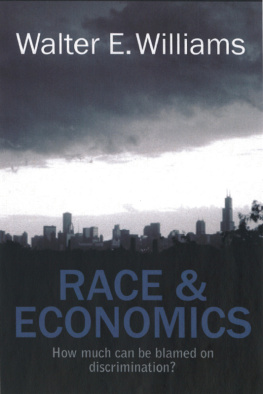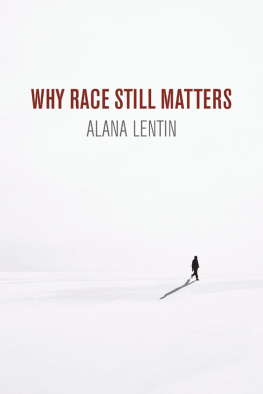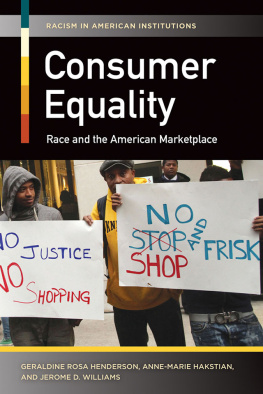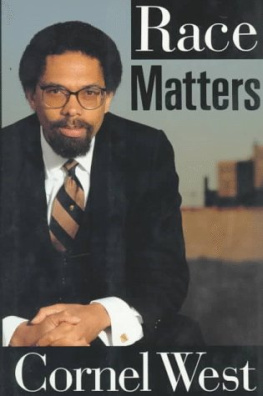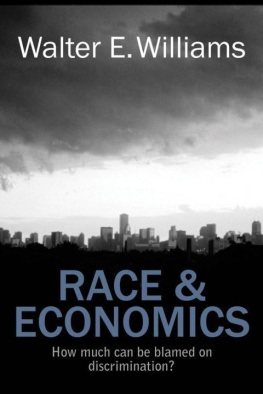First published 2006 by Ashgate Publishing
Published 2016 by Routledge
2 Park Square, Milton Park, Abingdon, Oxon OX14 4RN
711 Third Avenue, New York, NY 10017, USA
Routledge is an imprint of the Taylor & Francis Group, an informa business
Copyright 2006 Anne-Marie Mooney Cotter
All rights reserved. No part of this book may be reprinted or reproduced or utilised in any form or by any electronic, mechanical, or other means, now known or hereafter invented, including photocopying and recording, or in any information storage or retrieval system, without permission in writing from the publishers.
Anne-Marie Mooney Cotter has asserted her right under the Copyright, Designs and Patents Act, 1988, to be identified as the author of this work.
Notice:
Product or corporate names may be trademarks or registered trademarks, and are used only for identification and explanation without intent to infringe.
British Library Cataloguing in Publication Data
Cotter, Anne-Marie Mooney
Race matters : an international legal analysis of race discrimination
1.Race discrimination - Law and legislation - Cross-cultural studies
I.Title
342.0873
Library of Congress Control Number: 2006923721
ISBN-13: 978 0 7546 4562 7 (hbk)
Biography
Dr. Anne-Marie Mooney Cotter, Esq. is a Montrealer, fluent in both English and French. She earned her Bachelors degree from McGill University at age 18, and her Juris Doctor law degree from one of the leading civil rights institutions, Howard University School of Law. Her Doctorate degree (Ph.D.) was obtained from Concordia University, where she specialized in Political Economy International Law, particularly on the issue of equality. Her work experience has been extensive, acting as Chief Advisor and later Administrative Law Judge appointed by the Prime Minister to the Veterans Review and Appeals Tribunal in Canada. She has also been Supervising Attorney in Alaska for the Legal Services Corporation in the United States and later Executive Director; National Director for an environmental network in Canada; a member of the Faculty for Business Law at the Law School, Law Society of Ireland; Associate at the law firm of Blake Cassels and Graydon L.L.P with a secondment as in-house counsel with Agrium Inc., and Attorney with the Disability Law Center of Alaska. Dr. Cotter is a gold medallist in figure skating. She is married to Mark Badger.
Chapter 1
Introduction to Race Matters
So we come here today to dramatize a shameful condition. In a sense weve come to our nations capital to cash a check. When the architects of our republic wrote the magnificent words of the Constitution and the Declaration of Independence, they were signing a promissory note to which every (human) was to fall heir. This note was the promise that all would be guaranteed the unalienable rights of life, liberty, and the pursuit of happiness . A check which has come back marked insufficient funds. We refuse to believe that there are insufficient funds in the great vaults of opportunity of this nation. And so weve come to cash this check, a check that will give us upon demand the riches of freedom and the security of justice.
In our universal quest for justice, we may learn from the immortal words of one of the greatest civil rights leaders and human rights activists Dr. Martin Luther King Jr. This book, Race Matters, focuses on the goal of racial equality, and the importance of the law and legislation to combat discrimination. The aim of this book is to better understand the issue of inequality and to improve the likelihood of achieving racial equality in the future and ending racial inequality. Race Matters examines the primary role of legislation, which has an impact on the court process, as well as the primary role of the judicial system, which has an impact on the fight for racial equality.
Fundamental rights are rights which either are inherent in a person by natural law or are instituted in the citizen by the State. The ascending view of the natural law of divine origin over human law involves moral expectations in human beings through a social contract, which includes minimum moral rights of which one may not be deprived by government or society. The competing view is that courts operating under the Constitution can enforce only those guarantees which are expressed. Thus, legislation has an impact on the court system and on society as a whole. Internationally and nationally, attempts have been made to improve the situation of all races and ethnic groups and outlaw discrimination.
In looking at the relationship between race and the law, the book deals comprehensively with the issue of racial discrimination throughout its chapters: concludes this overview of racial inequality.
The globalization process and the various economic agreements have a direct impact on peoples lives as key players in the labor market today. This study seeks to comparatively analyze legislation impacting racial equality in various countries internationally. It also examines the two most important trade agreements of our day, namely the North American Free Trade Agreement and the European Union Treaty in a historical and compelling analysis of equality. Although an important trade agreement with implications for labor, the North American Free Trade Agreement has a different system from the European system in that it has no overseeing court with jurisdiction over the respective countries. Further, the provisions for non-discrimination in the labor process are contained in a separate document, the North American Agreement on Labor Cooperation. On the other hand, the European Union Treaty takes a different approach, by directly providing for non-discrimination, as well as an overseeing court, the European Court of Justice, and the treaty is made part of the domestic law of every Member State, weakening past discriminatory laws and judgments. Further, the European process actively implements racial equality by way of European Union legislation.
North America, as the new world with its image of freedom and equality, is considered to have made great strides in civil rights. However, the American philosophy of survival of the fittest and the pursuit of materialism have slowed down the process. With the advent of the European Union, the coming together of nations has had a very positive influence on the enforcement of human rights, much more so than that of North America, because of the unique European approach.
All parties must cooperate, and governments need to work with businesses, trade unions and society as a whole, and together, they can create an environment where all races can participate at all levels of political life and decision-making. Indeed, combating racial inequality and achieving racial equality requires a strong race matters focus in constitutional, legal, judicial and electoral frameworks for all races to be actively involved at the national and international levels.
According to liberal democracy, the rule of law is the foundation stone for the conduct of institutions. Race Matters


